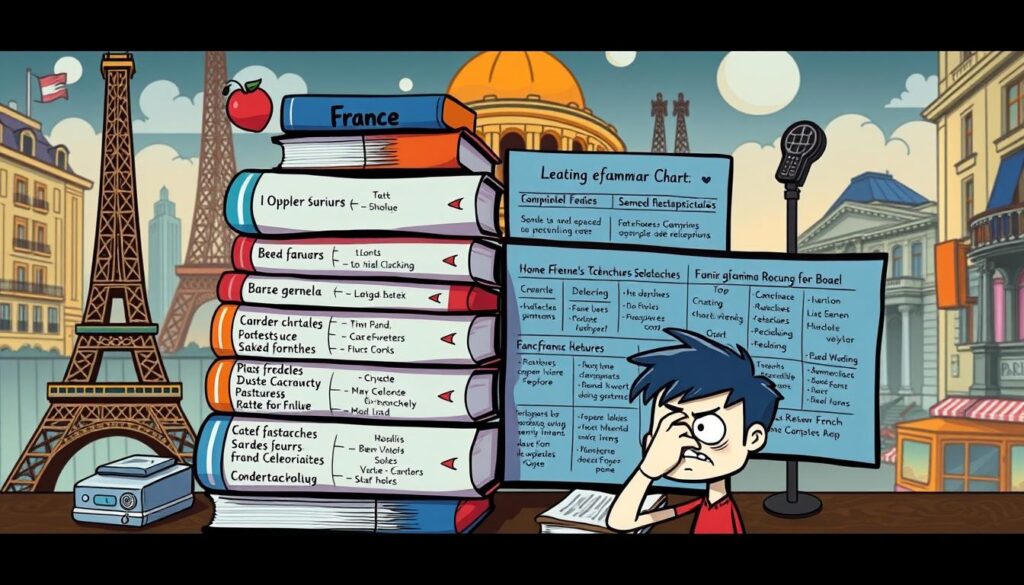Starting to learn French begins with knowing its alphabet. The 26 letters come from the Latin script. Knowing the French alphabet well is key. It is the first step to becoming fluent. As a beginner, the letters and sounds might seem hard. But with clear help for each letter, your French speaking and spelling will improve a lot.
The French language is unique because of certain marks and combined letters. These include L’Accent Aigu (é) and Joint Vowels (æ, œ). They give French its special sound and rhythm. These details are important for anyone wanting to improve their accent and understand French better. English speakers might find some French sounds hard, like the “r” and “u.” But with the right practice and tips, these can be mastered.
To learn these new sounds, mix technology, music, and practice. Using spaced repetition and memory aids helps too. Tools and exercises that are fun can really boost your learning. Listening to songs is a great way to remember sounds. It works well for people who learn by listening.
Learning French is like working on a big, beautiful project. Keep practicing regularly and be open to its unique sounds. This will make your French sound natural and confident. Let the music of the French alphabet help you learn in a fun way. And celebrate every step of your progress.
Understanding the Basics of the French Alphabet
Starting to learn French means getting to know its alphabet first. The French alphabet has 26 letters, just like English. But it’s got accents, silent letters, and special sounds. Knowing how to pronounce these letters is key to speaking well. Let’s dive into the basics of french phonetics. It’ll give you a good foundation for your language journey.
The 26 French Letters and Their Unique Pronunciations
Each of the french letters has its own sound. Some sounds are very different from English. For example, the French ‘j’ sounds like the ‘s’ in “measure,” not like the English ‘j’. Learning these sounds is important. It’s often the hardest part for beginners. Yet, with regular practice and the right french pronunciation tips, you can master them.
Accents and Diacritics: Enhancing French Pronunciation
Accents are a big deal in french phonetics. They can change how a letter sounds and even the meaning of words. Diacritics like accent aigu (é) and accent grave (è) are very useful. They help you understand how to pronounce words correctly. This brings out the beautiful rhythm and melody of the French language.
The Role of Silent Letters in French Words
In French, silent letters are common, and this can seem strange at first. The letter ‘h’ can be silent or aspirated, changing how words are pronounced. To get better at these, using French language resources is a great idea. They offer clear explanations and examples.
Learning French takes patience and practice. The special features of the French alphabet are your first steps toward fluency. They lead to a deeper understanding and the ability to join in rich cultural exchanges.
| Letter | Sound in French | Equivalent English Sound |
|---|---|---|
| A | a | a as in father |
| E | e, é, è, ê | e as in bed (varies with accents) |
| G | j | s in measure |
| U | u | Blend of ‘oo’ and ‘ee’ |
| H | silent or aspirated | — |
The Joy and Effectiveness of Learning Through Songs
Mastering a new language becomes fun when you mix learning with music. Enjoying french alphabet song and similar tunes makes remembering things easier. It uses the charm of melodies and beats to make language lessons exciting.
The French Alphabet Song: A Lyrical Approach to Learning
Songs like the French Alphabet Song are key for beginners. They introduce the sounds of French in an easy way. Using multimedia resources makes students remember and pronounce better. It’s a fun way to lay down the basics for more French learning.
Using Music to Solidify Memory and Pronunciation
Music is amazing for learning, especially for pronouncing new words. The repetition in songs helps with mastering French sounds and vocabulary. Adding french language books with phonetic aids to these songs makes learning full-circle, fun, and effective.
How Melodies Can Make Language Learning Enjoyable
Melodies turn study time into fun. They’re great for people who love listening to sounds and music. This method eases the stress of learning a new language. It makes the journey enjoyable and helps you remember your lessons better.
| Feature | Benefit |
|---|---|
| Integration of Melodies | Makes learning catchy and memorable |
| Application of Songs | Improves pronunciation and rhythm |
| Combination with Books | Provides visual reinforcement |
| Consistent Practice | Ensures long-term retention |
Techniques to Master the French Letters
To master the French language, you must use various proven techniques. These methods ensure success in language learning. From thorough pronunciation practice to participating in language quizzes, each approach is vital. They boost your French conversational skills. Here are some key strategies to make learning easier and improve your command of the French alphabet.
First, active listening is crucial. It lets you hear how French letters are used in real situations. Using online resources alongside this can help you understand each letter’s sound better. Moreover, recording how you pronounce words and getting feedback from native speakers will enhance your skills from basic to advanced.
Mnemonic devices are also powerful. They are great for remembering things, especially with French pronunciation tips. Flashcards, for instance, can visually and physically help you remember the unique sounds. They are helpful for vowels and consonants in the French alphabet.
Here’s a brief overview of the French alphabet that you may find useful:
| Vowel Sounds | Consonant Sounds | Common Diacritical Marks |
|---|---|---|
| 12 oral, 4 nasal, and 3 semi-vowels | 19 distinct sounds among 20 consonants | Acute, grave, circumflex, cedilla, trema |
| e.g., Oral: [a], Nasal: [ã], Semi-vowel: [j] | e.g., ‘S’ and ‘T’ share similar sounds | e.g., ‘é’ (acute), ‘ç’ (cedilla) |
Digital platforms can greatly aid your learning. Apps and websites designed for language learning provide lessons and feedback. They make learning adaptive and fun. Also, French study guides available online can greatly expand your vocabulary and pronunciation.
Finally, mastering the French alphabet can significantly improve your French conversational skills. With regular practice and the right techniques, you’ll speak French fluently and confidently.
Practical Exercises for Memorizing the French Alphabet
Mastering the French language starts with the alphabet. Mix daily activities, language apps, and writing practice into your study. This approach makes learning French letters deeper and longer-lasting.
Begin by exploring daily French alphabet drills. These are designed to help you know each letter and its sounds well. Drills can include listening to the alphabet song, repeating sounds, or writing letters to improve pronunciation.
Incorporating Daily French Alphabet Drills
Use alphabet worksheets that show each letter and its sound. This technique is great for learning letters and getting the pronunciation right from the start. For families, these worksheets make French for kids both fun and interactive.
Creative Language Apps for Strengthening Your Skills
Check out the many language apps that turn learning the French alphabet into a game. These apps have games, quizzes, and french flashcards, great for extra practice. Doing activities on these apps can really help you remember and understand better.
Writing French: A Path to Alphabet Mastery
Writing by hand helps you remember what you learn. Try exercises that have you write letters and words. Using these skills in real situations helps you learn faster and get ready for more French studies.
| Exercise Type | Tools | Benefits |
|---|---|---|
| Alphabet Worksheets | Paper, Digital Formats | Visual learning, pronunciation guide |
| Language Apps | Mobile, Tablet | Interactivity, gamification |
| Writing Practice | Notebooks, Online platforms | Hands-on experience, spelling proficiency |
Don’t forget, practicing regularly on different platforms enhances learning. Try french learning videos and online french courses too. Use pronunciation tools and dive into a learning experience that’s both fun and educational.
How to Learn French Alphabet with Interactive Learning Tools
Learning a new language is both fun and challenging. French is spoken by 277 million people worldwide. Knowing how to pronounce French correctly is key. French alphabet resources are super helpful for starters. These tools are designed for different ways of learning. They help you master all 26 letters, the rules of pronunciation, and sounds like the “U” or “Y.”
Language apps are essential in this learning process. They have games and special tasks that help with common hurdles. For example, they teach about different accent marks and the 28 regional accents in France. Using these tools means diving into a deep learning experience. It’s both fun and educational. Quizzes, for example, let you check what you know and see your improvement. This boosts your confidence as you get better at the language.
Understanding the variety of French sounds is important. Think of the “G” sounds or the meanings shown by digraphs. The Rocket French Interactive Audio Course is great for this. It lets you listen to real conversations between native speakers. Such dynamic study methods help you remember better. You learn the subtle differences in words that look the same but mean different things. So, start exploring the interactive world of learning French today. It’s a joyous and effective way to improve your language skills with modern tools.


